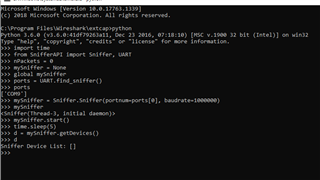I'm using nRF51 BLE dongle as a sniffer and trying to capture BLE packets through CLI. I'm using example.py which came with nRF sniffer software.
I unable to get the list of devices when using 'example.py' code. I have tried the steps as described in "Sniffer API Guide".
Still the output "Sniffer Device List:[]" is sample.
If I'm right once the device is listed, I can able to sniffer the BLE packets of the listed device.Please let me know, If i'm doing anything wrong here.
Attached CLI output and 'example.py' code file which I'm trying to execute.
EDIT :
Adding software & Hardware Config details :
Sniffer software version : nrf_sniffer_for_bluetooth_le_3.0.0_129d2b3
Flash bin file : sniffer_pca10031_129d2b3.hex
Dongle HW version : 1.0.0

# Copyright (c) 2017, Nordic Semiconductor ASA
#
# All rights reserved.
#
# Redistribution and use in source and binary forms, with or without
# modification, are permitted provided that the following conditions
# are met:
#
# 1. Redistributions of source code must retain the above copyright
# notice, this list of conditions and the following disclaimer.
#
# 2. Redistributions in binary form must reproduce the above
# copyright notice, this list of conditions and the following
# disclaimer in the documentation and/or other materials provided
# with the distribution.
#
# 3. Neither the name of Nordic Semiconductor ASA nor the names of
# its contributors may be used to endorse or promote products
# derived from this software without specific prior written
# permission.
#
# THIS SOFTWARE IS PROVIDED BY THE COPYRIGHT HOLDERS AND CONTRIBUTORS
# "AS IS" AND ANY EXPRESS OR IMPLIED WARRANTIES, INCLUDING, BUT NOT
# LIMITED TO, THE IMPLIED WARRANTIES OF MERCHANTABILITY, AND FITNESS
# FOR A PARTICULAR PURPOSE ARE DISCLAIMED. IN NO EVENT SHALL NORDIC
# SEMICONDUCTOR ASA OR CONTRIBUTORS BE LIABLE FOR ANY DIRECT,
# INDIRECT, INCIDENTAL, SPECIAL, EXEMPLARY, OR CONSEQUENTIAL DAMAGES
# (INCLUDING, BUT NOT LIMITED TO, PROCUREMENT OF SUBSTITUTE GOODS OR
# SERVICES; LOSS OF USE, DATA, OR PROFITS; OR BUSINESS INTERRUPTION)
# HOWEVER CAUSED AND ON ANY THEORY OF LIABILITY, WHETHER IN CONTRACT,
# STRICT LIABILITY, OR TORT (INCLUDING NEGLIGENCE OR OTHERWISE)
# ARISING IN ANY WAY OUT OF THE USE OF THIS SOFTWARE, EVEN IF ADVISED
# OF THE POSSIBILITY OF SUCH DAMAGE.
import time
from SnifferAPI import Sniffer, UART
nPackets = 0
mySniffer = None
def setup():
global mySniffer
# Find connected sniffers
ports = UART.find_sniffer()
if len(ports) > 0:
# Initialize the sniffer on the first COM port found with baudrate 1000000.
# If you are using an old firmware version <= 2.0.0, simply remove the baudrate parameter here.
mySniffer = Sniffer.Sniffer(portnum=ports[0], baudrate=1000000)
else:
print("No sniffers found!")
return
# Start the sniffer module. This call is mandatory.
mySniffer.start()
# Wait to allow the sniffer to discover device mySniffer.
time.sleep(5)
# Retrieve list of discovered devicemySniffer.
d = mySniffer.getDevices()
# Find device with name "Example".
dev = d.find('Example')
if dev is not None:
# Follow (sniff) device "Example". This call sends a REQ_FOLLOW command over UART.
mySniffer.follow(dev)
else:
print("Could not find device")
def loop():
# Enter main loop
nLoops = 0
while True:
time.sleep(0.1)
# Get (pop) unprocessed BLE packets.
packets = mySniffer.getPackets()
processPackets(packets) # function defined below
nLoops += 1
# print diagnostics every so often
if nLoops % 20 == 0:
print(mySniffer.getDevices())
print("inConnection", mySniffer.inConnection)
print("currentConnectRequest", mySniffer.currentConnectRequest)
print("packetsInLastConnection", mySniffer.packetsInLastConnection)
print("nPackets", nPackets)
print()
# Takes list of packets
def processPackets(packets):
for packet in packets:
# packet is of type Packet
# packet.blePacket is of type BlePacket
global nPackets
# if packet.OK:
# Counts number of packets which are not malformed.
nPackets += 1
setup()
if mySniffer is not None:
loop()


